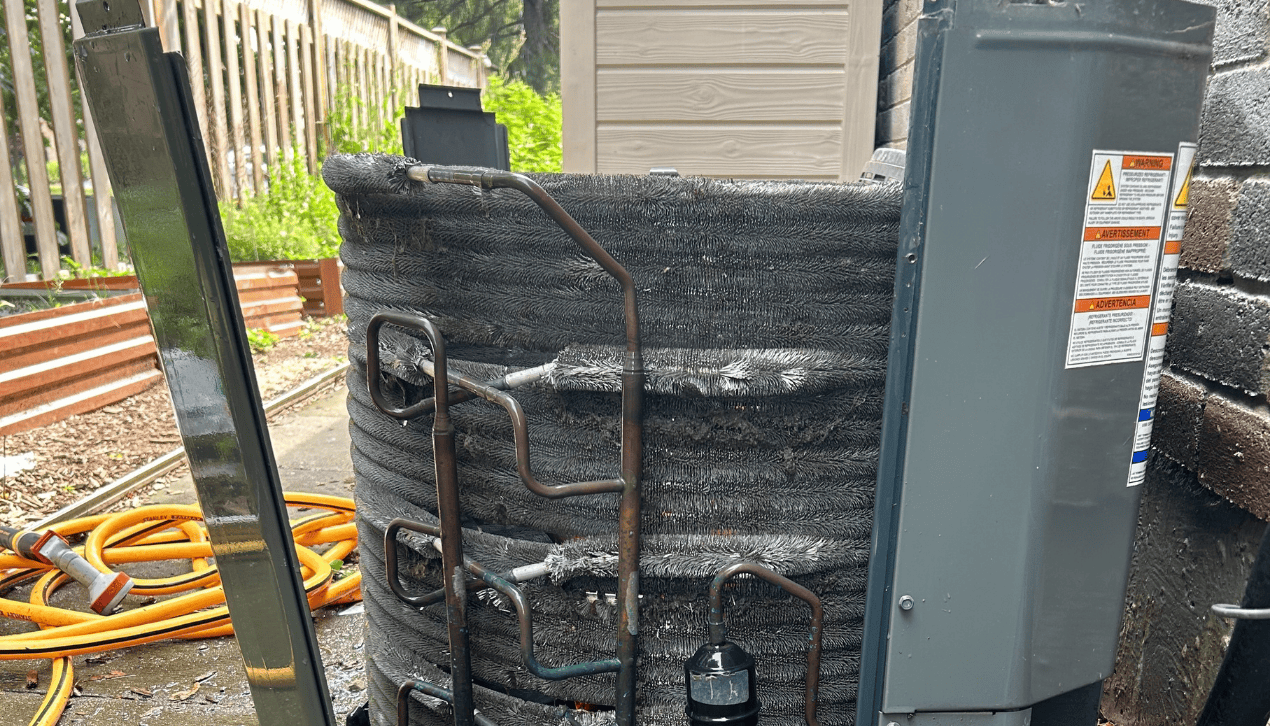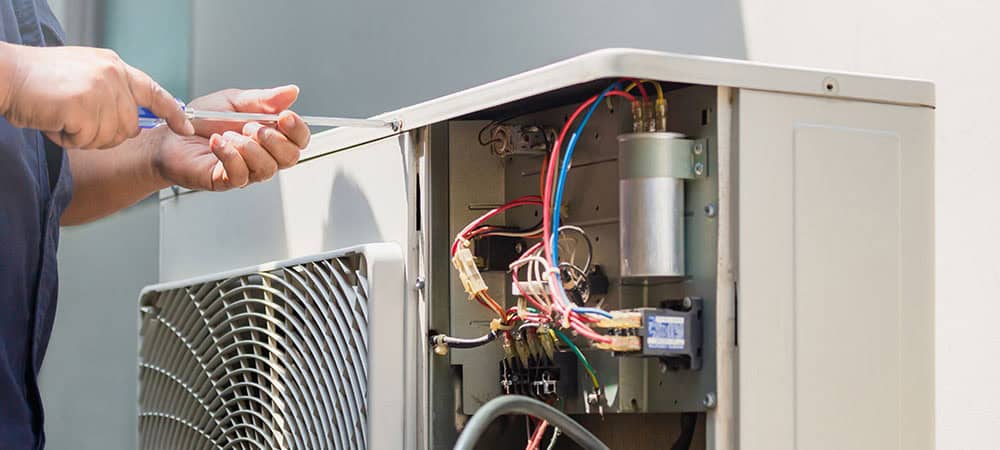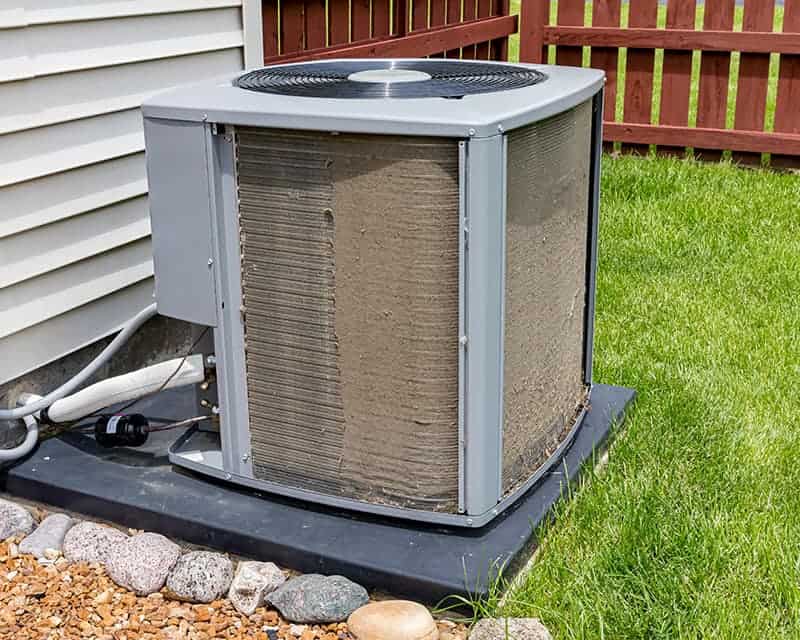When your AC fan stops working, it might be due to electrical troubles like a broken capacitor or faulty control board. Physical issues such as a worn-out motor, blocked fan blades, or damaged bearings can also make the fan stop.
Things in the environment, like too much dust and dirt, can block airflow and keep the fan from working right.
To fix your AC system, you need to figure out what’s wrong. The next parts talk more about the common reasons an AC fan might not work and how to fix them.
Key Takeaways
- Broken capacitor often causes AC fan to stop working, as it helps start and run the motor. Putting in a new capacitor can fix the problem.
- Wiring issues or control board faults can mess up fan operation by sending wrong signals. Fixing electrical problems can make the fan work right again.
- Problems with the fan motor, like burning out, worn bearings, or need for oiling, can stop the fan from running well. Motor fixes or replacement might be needed.
- Things blocking the fan, such as dust, bits of stuff, or damage to the fan blades, can slow airflow and make the fan work badly. Cleaning and fixing any physical issues is key.
- Thermostat troubles, like wrong settings or a broken unit, can also affect how the fan works by sending bad signals. Checking the thermostat may help solve the issue.
Understanding AC Fan Mechanics
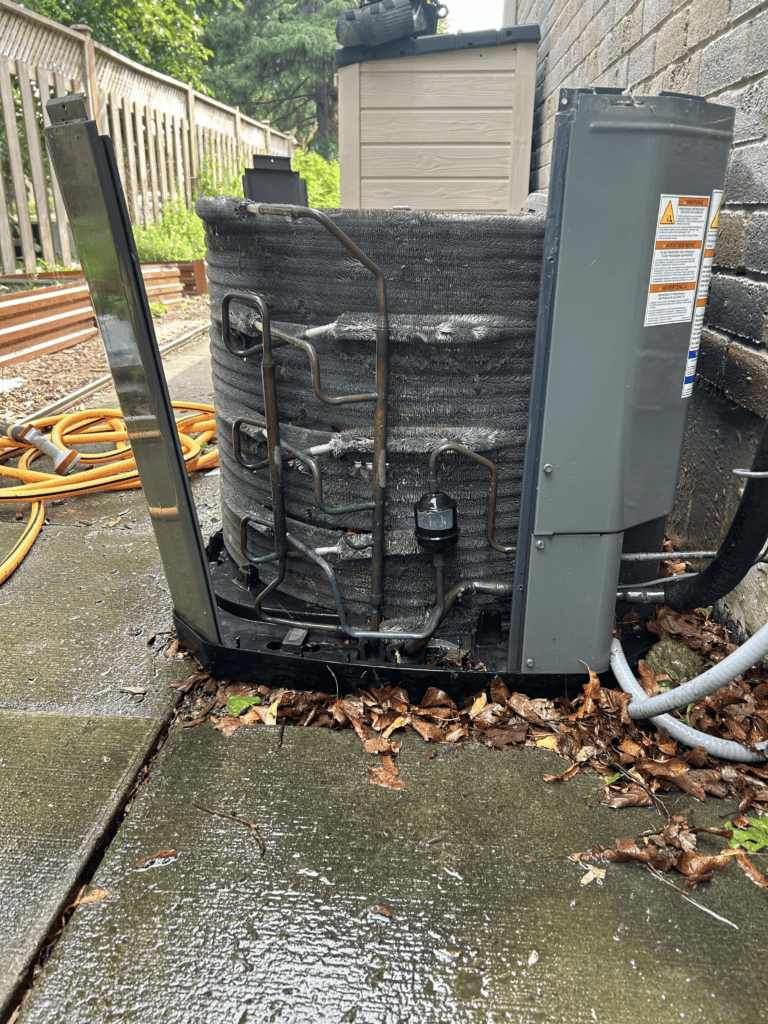
The cooling system in your home needs its fan to move chilly air around. Different AC types use fans in various ways, like pulling in warm air or pushing out hot air. When your AC fan isn’t running well, it can cause many problems that you should fix quickly.
The Role of the Fan in Your Air Conditioning System
The fan plays a crucial role in your air conditioning system. It’s the main part that moves cool air around your home. The fan pulls air over the evaporator coil, which takes heat out of the indoor air. Then, it pushes this cooled air through the ducts and into your rooms.
If the fan doesn’t work well, the air conditioner can’t spread the cool air properly. This can lead to uneven cooling and problems with other parts like the compressor and condenser coil. Additionally, insufficient airflow can cause the system to overheat, risking further damage to critical components. It’s important to address these issues promptly to avoid costly repairs and ensure optimal performance. Commonly, the top reasons for warm air flow include a clogged air filter, a malfunctioning thermostat, or low refrigerant levels.
An electric motor powers the fan and a control board manages it. Issues with the fan motor, capacitor, or control board can stop the fan from working correctly. When this happens, it needs quick checking and fixing.
Types of AC Fans and Their Functions
Air conditioning systems have different kinds of fans, each with a special job. The two main ones are the indoor fan and the outdoor fan, which are very important for cooling.
The indoor fan moves cool air from the cooling coil into your home. It often uses motors like the Emerson K55HXDND-8984 or Century FSE1026SV1. The outdoor fan takes warm air from your house and pushes it outside, helping the cooling liquid get rid of heat. It might use motors like the GE 5KCP39PGS069S or Packard 43733.
Some systems also have a fan that can change speed, like the Mars 10729 PSC or ECM motor, to save energy. These fans help make the whole system work better.
Signs of a Malfunctioning AC Fan
Signs of a broken AC fan include strange sounds, less air coming out, and the fan not turning on or working properly. These problems might be due to a faulty part called a capacitor, a burnt-out motor, or loose wires.
If the fan isn’t running at all, check if the circuit breaker has tripped. To find out what’s wrong, first look at the capacitor and add oil to the fan motor. Use special tools to check the electricity and parts.
You can also use a thermometer to see if the motor is too hot. Fixing these common issues can often get your AC fan working again.
Electrical Issues Affecting AC Fan Operation
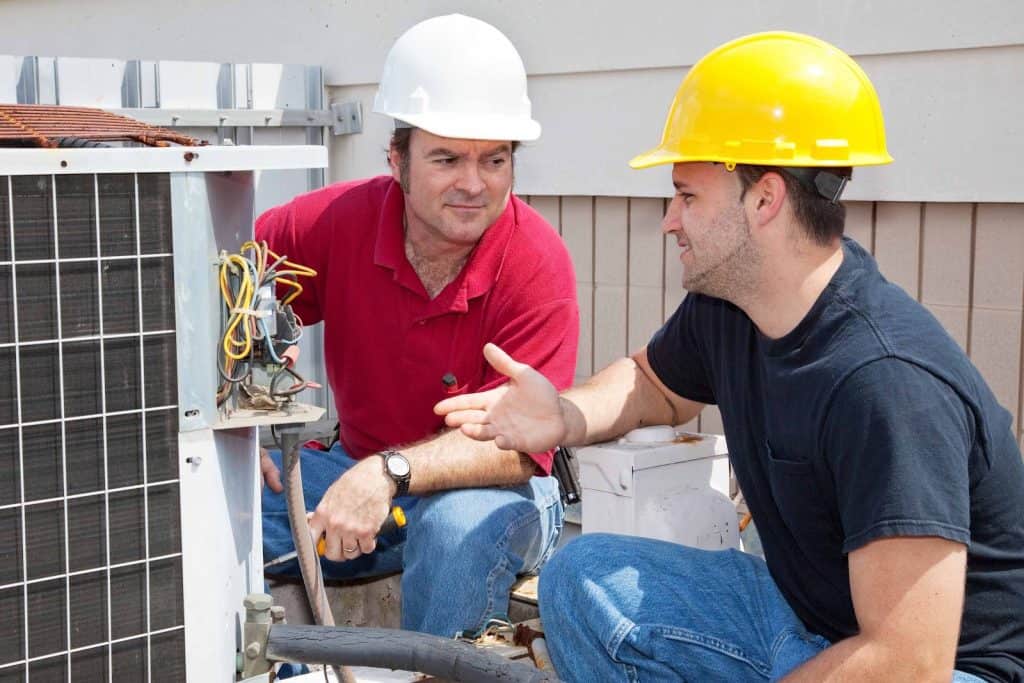
When your AC fan isn’t working right, it might be because of electrical troubles in the system. Common problems include broken capacitors, faulty wiring, or thermostat issues.
It’s important to understand these electrical problems to fix the main cause and get your AC running again.
We’ll look at how these electrical issues can affect your fan’s work and what you can do to solve them.
Capacitor Failure: A Common Culprit
A broken capacitor is often behind AC fan problems. The capacitor helps start and run the fan motor. Different AC systems use various capacitor types, like start capacitors, run capacitors, and dual run capacitors.
When the electrolytic capacitor stops working, the fan motor might not start or work poorly. This issue happens in many AC types, including central air, window units, ductless mini-splits, and portable air conditioners.
Fixing a broken capacitor is usually easy, but you need to find the right replacement part to make sure the fan works well.
Wiring Problems and Circuit Board Malfunctions
Wiring troubles and circuit board problems can mess up how your AC fan works. Bad wire connections or a broken control board might stop the fan from starting or make it run oddly. Look at the electrical parts and connections carefully to make sure they’re working well.
The main control board, communication control board, or power control board could be causing trouble.
Some examples are the Honeywell ST9120U1011 fan control board, ICM Controls ICM2807 furnace control board, Rheem 47-102684-06 control board, or Goodman PCBDM133S control board. Also, issues with the Carrier HK32EA001 circuit board could cause electrical problems that affect the AC fan.
It’s important to check and fix any wiring or circuit board problems to get the fan working properly again.
Thermostat Issues Impacting Fan Performance

Thermostat troubles can greatly affect how your AC fan works. If your thermostat isn’t set up right or is broken, it might send the wrong signals to the fan. This can make the fan run oddly or not turn on at all.
Make sure your thermostat is working well by checking its temperature settings and batteries. Use a set of screwdrivers to look at the wire connections. Think about getting a new thermostat you can program or control with Wi-Fi for better temperature control. Regular upkeep, like cleaning and resetting the thermostat, can also help stop problems.
If the thermostat is faulty, you might need to replace the whole unit with a basic or smart thermostat to get your AC fan working properly again.
Read about the potential consequences of a compressor failure in your air conditioner.
Mechanical Problems with AC Fans
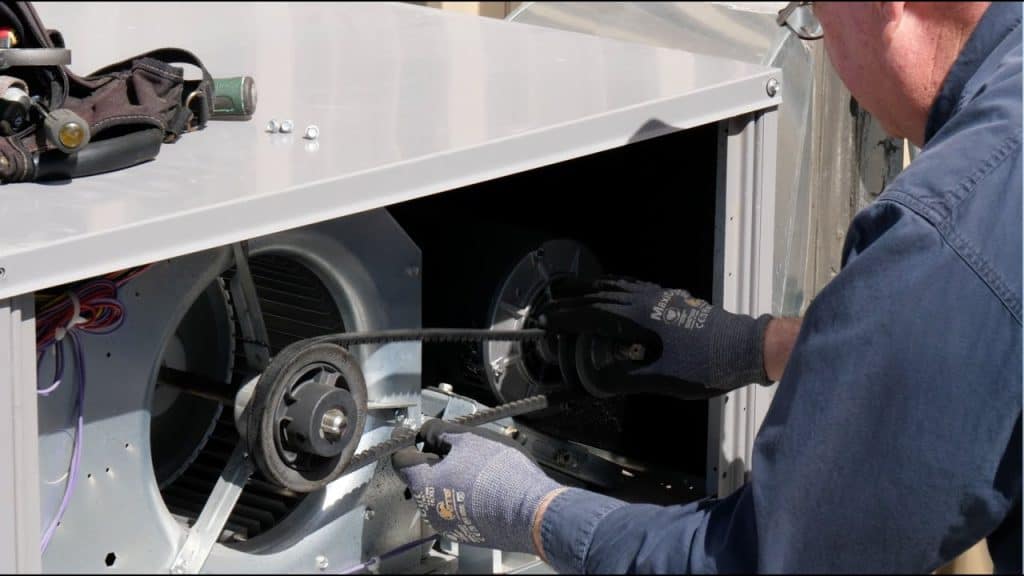
AC fans can face mechanical troubles that cause various problems. These might include the fan motor breaking down, bearings wearing out, things blocking the fan, or damage to the blades.
It’s important to fix these issues quickly. We’ll look at why these problems happen and how to solve them to get your AC working well again.
Fan Motor Burnout: Causes and Solutions
Fan motor burnout can really mess up how well your air conditioning works. It’s important to find out why it’s happening and fix it quickly. Some common reasons for this problem include:
- Problems with electricity like changing voltage, bad wiring, or a broken capacitor
- Parts of the motor wearing out over time, like bearings or the shaft
- Things blocking air from moving properly, making the motor get too hot
- Not taking care of the system regularly, so dirt and junk build up
- Mistakes made when the motor was made at the factory
If your AC fan is making weird noises or has stopped working, it’s best to get an expert to look at it. If you ignore a burnt-out fan motor, it can hurt other parts of your system. So, don’t wait to deal with this big HVAC issue.
Bearing Wear and Lubrication Needs
A common mechanical issue affecting AC fans is bearing wear, which can greatly impact how well they work if not fixed quickly. Over time, the bearings that hold up the fan’s motor shaft can wear out, causing more shaking, noise, and even total breakdown.
To stop this, you need to make sure the bearings are properly oiled as the maker suggests. Look for AC units with direct drive motors and fan blade designs that reduce shaking. Advanced shaking isolation and noise lowering technology can also help lessen these problems.
Also, parts that resist rust and a weather-proof case are important for outdoor units that face tough weather. Keeping up with upkeep, like adding a compressor sound cover, is key to keeping AC fans working their best.
Physical Obstructions and Damage to Fan Blades
Physical obstructions and damage to fan blades can greatly hurt an AC unit’s performance. Debris, objects, or even damage can stop the fan blades from spinning freely and moving air well.
Common problems include:
- Buildup of dust, dirt, and grime on the fan blades and condenser coils
- Bent or broken fan blades that rub against the housing
- Things like sticks, leaves, or small animals stuck inside the unit
- Harm from hail or other hits, causing cracks or odd shapes
- Overgrown plants or yard waste blocking the package unit’s air intake
If you hear odd noises, feel poor cooling, or notice weak airflow, check the fan blades for any physical issues and take care to ensure the best performance.
Environmental Factors Impacting AC Fan Function
Things outside your control can greatly affect how well your AC fan works. For example, when the condenser coils get dirty, they can block airflow and make the fan less effective.
Also, very hot or humid weather can put extra stress on your AC system, which can change how the fan runs. These environmental factors are important to consider when thinking about your AC fan’s performance.
The Effects of Dirty Condenser Coils on Fan Performance
When your air conditioner’s condenser coils get very dirty, it can greatly affect how well the fan works. Dirty coils make it harder for air to flow, forcing the fan to work more and use more power. This can cause:
- Lower SEER rating and less efficiency
- Not enough cooling power
- Higher running costs
- Shorter life for the compressor
- Louder noise when running
To stop these problems, it’s important to clean the condenser coils often. This helps air flow better, makes the fan work better, and improves how well your whole HVAC system runs. Make sure you have good insulation, the right size unit, and think about getting an electronically commutated motor (ECM) fan for the best airflow (CFM) and energy savings.
How Extreme Weather Conditions Can Affect Your AC Fan
Extreme weather can really affect how well your AC fan works, making it harder to cool your home properly. During very hot spells, the fan might struggle to pull enough air over the cooling coils, which reduces how well it cools.
In very cold weather, the fan motor can freeze up, stopping air from moving around. It’s important to check your air filter, coolant levels, and the part that controls defrosting to make sure your AC fan works well in different weather.
Getting a unit that can change its speed can help your fan work better, as it can adjust based on cooling needs and humidity. Regular upkeep of your AC is crucial to keep the fan running well, no matter the weather.
Indoor Air Quality and Its Relation to Fan Efficiency
The weather outside can greatly affect how well AC fans work, but the quality of air inside is also very important for fan efficiency. Dirty air filters can block airflow, making the fan work harder and use more power.
Dust, pet hair, and other bits in the air can build up on fan blades, causing them to be off-balance and shake. This not only makes the fan less effective but can also wear it out faster.
To keep your fan working well, clean or change your AC’s air filters often, as advised by companies like Carrier, Trane, Lennox, Rheem, and Goodman. An Energy Star-approved AC with a good dual-run capacitor, such as the Powerwell 50+5 MFD, can also help improve indoor air quality and how well the fan works.
Maintenance and Prevention Strategies
Regular upkeep of your AC unit is crucial to avoid fan troubles in the future. You can try basic do-it-yourself fixes for small problems, but for anything complicated, it’s wise to ring up a skilled HVAC worker who can properly find and mend the issue.
Keeping up with maintenance and knowing when to ask for expert aid will ensure your AC system runs well and doesn’t waste energy.
Regular AC Maintenance to Prevent Fan Issues
Checking and fixing your air conditioner’s fan often helps stop problems and keeps it working well. This includes: Regularly cleaning the fan blades and ensuring they are free of debris can prevent unnecessary strain on the system. Additionally, monitoring for wear and tear can help identify the top causes of air conditioner noise, allowing for timely repairs. This proactive approach not only enhances performance but also prolongs the life of your unit. Furthermore, addressing issues such as loose components or imbalanced blades can significantly reduce the top causes of air conditioner noise. Regular maintenance checks can reveal underlying problems before they escalate, ensuring that your unit runs quietly and efficiently. By staying ahead of potential issues, you can save on costly repairs and enjoy a more comfortable indoor environment.
- Washing the fan blades and case to get rid of dust and dirt
- Looking at the fan motor for wear or damage, and putting in a new one if needed
- Oiling the fan’s bearings to make it run smoother and last longer
- Making sure the fan is firmly attached and balanced for quiet use
- Checking that the fan’s electrical wires are tight and not rusty
DIY Troubleshooting Steps for AC Fan Problems
When your AC fan isn’t working right, try these simple steps to find and fix the problem. First, look for anything blocking the fan or stopping it from turning easily. Then, check the fan motor and capacitor for damage or wear. If the motor is broken, you might need a new one. Make sure all the wires are connected tightly and not rusty. Look at the thermostat to see if it’s controlling the fan properly. If the fan keeps turning on and off quickly or runs all the time, there might be a problem with how it senses power or the coolant levels. Use your AC’s phone app or voice control to see energy use reports and error codes that can help you figure out what’s wrong.
When to Call a Professional HVAC Technician
Even with your best do-it-yourself tries, sometimes AC fan problems need a professional HVAC expert. Trying to fix tricky issues on your own could cause more harm or be unsafe if you don’t have the right skills and tools.
Call the pros when you notice:
- Weird sounds, shaking, or odd fan behaviour
- Poor airflow or uneven cooling in different areas
- Can’t change fan speed or connect with smart home setups
- Worries about saving energy, controlling dampness, or eco-friendly design
- Need for detailed checks, area management, or high-use planning
A good HVAC expert can quickly find the main problem and suggest the best fix, whether it’s a small repair or a bigger system update for long-lasting performance and energy savings.
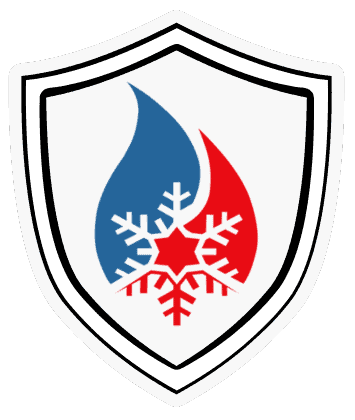
ALPCare Maintenance Plans
Protection All Year-Round.
Experience Perfect Temperatures in Every Season — Affordably.
Explore Our Plans


